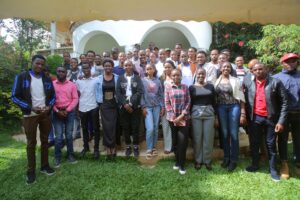In 44 B.C., Julius Caesar walked into the Senate, unaware that the very men who once cheered his triumphs were sharpening knives behind their togas. His betrayal wasn’t just a personal tragedy, it was the climax of a political order collapsing under its own contradictions. The Republic was dying, and Rome, that great lion of the ancient world, was about to be ruled by emperors rather than institutions.
In Kajiado, the tremors ahead of 2027 may not come with daggers, but the symbolic stabbings have begun.
The political weather has shifted. And while the old guard still clings to state-backed umbrellas, the storm no longer respects their shade.
Enter Wamunyoro: Seki’s Calculated Crusade
Senator Samuel Ole Seki, now dubbed the “Wamunyoro” candidate, is not just contesting, he’s redefining the battlefield. With former Deputy President Rigathi Gachagua wielding influence in the Kikuyu-rich Kajiado North, and a possible alliance with Kalonzo Musyoka that could draw Kamba support from areas like Kitengela in Kajiado East, Seki’s coalition resembles something out of Bismarck’s playbook: pragmatic, multi-ethnic, and terrifyingly effective.
He has embraced the old Roman doctrine: Divide your enemies. Unite your allies. And above all, seize the moment when the ground is shifting beneath their feet.
In the words of Sun Tzu, “Opportunities multiply as they are seized.”
Katoo: The Fall of a Fractured Frontrunner
Enter Katoo Ole Metito — or rather, exit. Once the presumed heir to Kajiado’s gubernatorial seat, he now finds himself like King Saul after the anointing of David, still seated, but already rejected. Intelligence reports point to an erosion of trust, disconnection from the electorate, and a dependence on government machinery rather than popular legitimacy.
The Psalmist wrote, “Some trust in chariots and some in horses, but we trust in the name of the Lord our God” (Psalm 20:7). Katoo trusted too heavily in chariots, fueled by state privilege, but the people have stopped following his convoy.
Despite state funding, long weekends for campaign retreats, and a blank cheque for logistics, his campaign has lacked what Cicero once called the soul of politics: credibility.
His problem? He forgot the first rule of politics in Maa country: You must first speak to the soul of the people before you count on their votes. Katoo has spent a career renting voter blocs instead of cultivating them. Now, the landlords want their votes back and he’s holding an expired lease.
As Proverbs 25:19 warns: “Confidence in an unfaithful man in times of trouble is like a broken tooth and a foot out of joint.”
The Memusi Option: A Calculated Pivot
In response to Seki’s surge, the state has been forced to reassess its preferred gubernatorial flagbearer. Former frontrunner Katoo Ole Metito, now viewed as a liability, has lost substantial ground, despite generous support. While he once relied on votes from other tribes in Kajiado South as an MP, he has failed to consolidate a Maa support base.
With Katoo’s decline, attention has shifted to Hon. Memusi Ole Kanchory, the MP for Kajiado Central. He has demonstrated a formidable grassroots presence and is increasingly seen as the only viable candidate to counter Seki’s rising influence.
Like Cincinnatus called from his farm to save the Roman Republic, Memusi is being summoned from the heart of Kajiado Central to rescue a fragmented county.
Governor Joseph Ole Lenku, a student of survival, a man who knows which way the wind is blowing (often because he’s the one blowing it) has quietly shown he is more comfortable with Memusi than Katoo. Not out of sentiment, but out of calculation.
Memusi’s rise mirrors that of biblical David, underestimated, rugged, yet possessing the one thing Saul lacked: favor with the people. As 1 Samuel 18:16 records: “But all Israel and Judah loved David, because he went out and came in before them.”
The people chant his name, not because of press conferences, but because he shows up at burials, weddings, and in the dust of local football matches.
Ledama’s Sajiloni Gambit: A “Unity” Disguised as Coronation
Senator Ledama Ole Kina arrived in Sajiloni promising unity. What unfolded was political theater disguised as reconciliation. It bore all the marks of a coronation, excluding dissenters, elevating loyalists, and branding it all with empowerment jargon.
As George Orwell warned in Animal Farm: “All animals are equal, but some animals are more equal than others.”
Ledama’s role has been painted as that of a hired political mercenary, brought in by Katoo, an embattled man scrambling to revive a dying career. The meeting failed to promote unity and instead amplified clannism and self-interest. His silence on Narok’s own burning issues, from land grabs in Olkeri to conflict in Kilgoris, raises a question: Can a man who has gone mute in his own house preach unity in another?
James 2:16 warns of empty blessings: “If one of you says to them, ‘Go in peace; keep warm and well fed,’ but does nothing about their physical needs, what good is it?”
The attempt to declare Katoo as the ‘broad-based government candidate’ was met with skepticism. For many in Kajiado, it was clear: Katoo had panicked.
His political tactics have backfired. Attempts to divide the Maa community along clan lines have only further isolated him. Even with state machinery behind him, the ground remains firmly out of reach.
The Sajiloni meeting, branded as a unity forum, became a public relations disaster. Attendees quickly saw through the charade: it was a disguised coronation, engineered by Ledama, a man increasingly disconnected from the people’s real struggles.
True unity, as many noted, must include religious leaders, elected and aspiring politicians, opinion shapers, and voices across political lines, not secretive forums driven by political conmanship.
Clannism, Opportunism, and the Erosion of Legacy
Ledama and Katoo’s playbook, rooted in clannism, has been sharply criticized. Their gathering was nothing more than a thinly veiled endorsement. Ledama, from the Ilmolelian clan (the same as Katoo), has been accused of using clan affiliations as a political tool a move that was widely seen as divisive and insincere.
This brand of politics is not new. It echoes the worst of 19th-century Balkan tribalism, alliances built on bloodlines, not beliefs. And we all know how that ended: fragmentation, war, and the slow, grinding death of shared identity.
As Benjamin Disraeli once said, “A Conservative government is an organized hypocrisy.” Ledama’s Sajiloni meeting might just be remembered as a masterclass in organized hypocrisy.
The Prince Who Lost His Grip
If Katoo remains the state’s plan A, then someone at OP is asleep at the controls. The once-proud prince of Kajiado politics now roams like a monarch in exile, rich in title, poor in subjects.
His attempt to reboot his image through Ledama’s “unity” forum only reinforced the narrative: he’s out of touch, out of time, and nearly out of options.
His bid to be branded a “broad-based candidate” reeks of panic. As Ecclesiastes 10:1 warns: “Dead flies make the perfumer’s ointment give off a stench; so a little folly outweighs wisdom and honor.”
Katoo once held the scepter of the state’s trust, now he clutches at straws. Machiavelli advised rulers to be both lion and fox. Katoo has become the political equivalent of a mole, blind to the moment, burrowing in outdated strategies, allergic to daylight.
He is King Lear, aging, raging, and surrounded by a storm of his own making.
Seki vs. Memusi: The Final Act Begins
The battleground is clear: Seki vs. Memusi.
Kajiado Central, once a sleepy midpoint, is now the epicenter. On one side: Seki, backed by national muscle, a Kikuyu machine, and a budding Kamba alliance. On the other: Memusi, grounded, connected, and increasingly anointed by both the grassroots and the state.
This is not just about winning a county seat. It’s a test of political ideology: Can a candidate built on strategic alliances and outside power defeat one crafted by sweat, memory, and presence?
In the words of Victor Hugo, “Nothing is more powerful than an idea whose time has come.” Seki’s coalition might just be that, the idea whose time has arrived. But Memusi represents something equally potent: the people’s memory, and memory, as T.S. Eliot observed, is “a pattern of timeless moments.”
Kajiado 2027: A Reckoning, Not a Race
What is unfolding is not merely electoral. It is existential.
Kajiado South has had its moment. Now, the Central must speak. And the voice it raises will echo far beyond county boundaries into the soul of a people trying to find leadership that is not only clever but wise; not only loud, but just.
Isaiah 1:26 offers a blueprint for the hope ahead: “I will restore your leaders as in days of old, your rulers as at the beginning. Afterward you will be called the City of Righteousness, the Faithful City.”
As the county hurtles toward 2027, one thing is certain: this won’t be business as usual.
It will be a prophecy fulfilled or failed.
The author is a Lecturer, Analyst of Power and Politics, Student of Tacitus






Well put
So powerful
What a masterpiece, facts notwithstanding.
A powerful masterpiece kudos.
A factual masterpiece kudos.